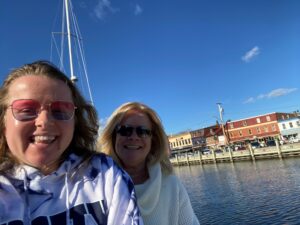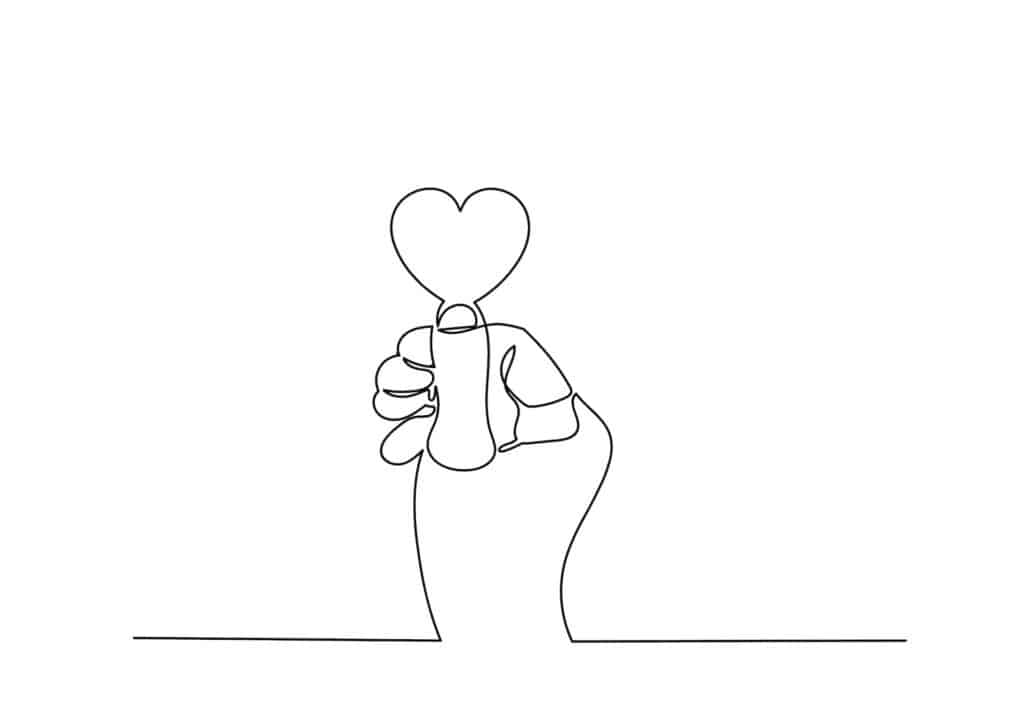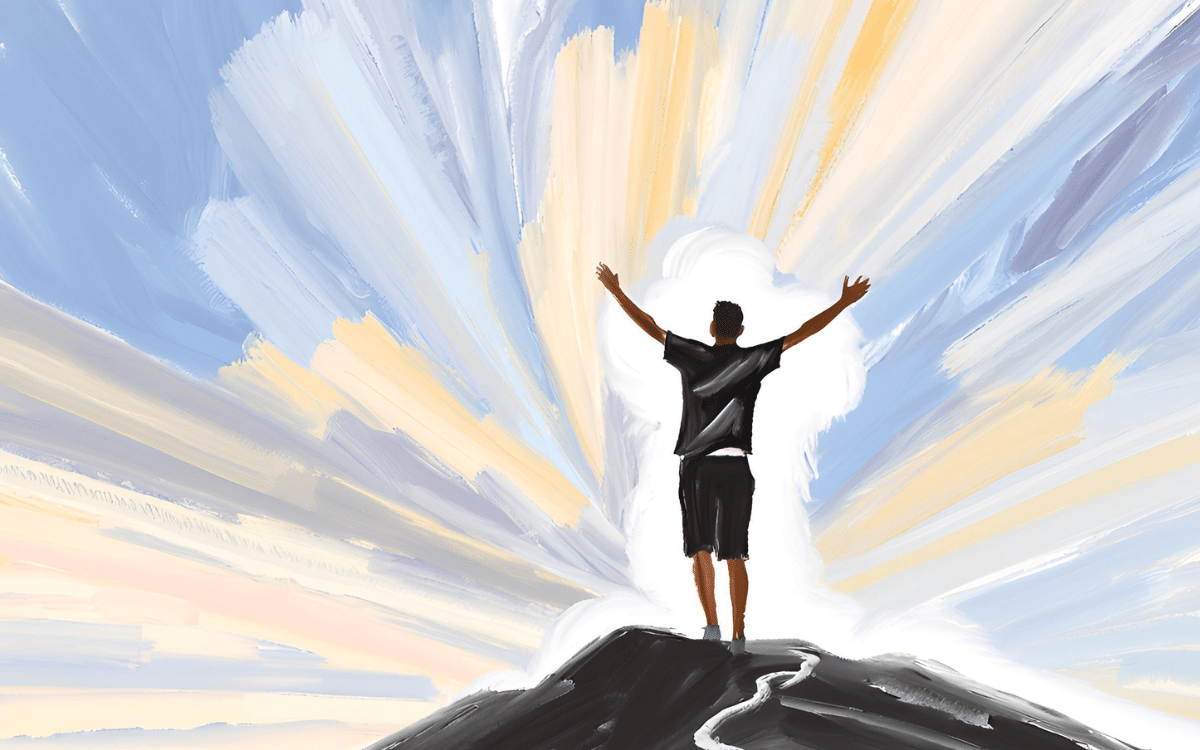Our journey is similar to many who came before us and many more in the future who will experience the silent epidemic of mental illness.
The beginning of our journey
Before Lifeskills, our daughter went to college to pursue an undergraduate degree. She flourished while she was there; she made the Dean’s List 3 times during her 4 years. Things were going well, and the future was bright.
During her final year, something changed – she was distant and didn’t come home. Looking back, this is when changes in her behavior were starting to be noticed by those around her, especially her mentor. We chalked it up to her spreading her wings.
After completing her undergraduate degree, she continued right into a Master’s Degree program in Human Resources Leadership Development. It was around this time that she started becoming increasingly paranoid and hearing voices. She appeared to be living in a world of her own making. While the symptoms of mental illness were observed by those in her community, we weren’t aware of how severe they had become. Because our daughter is an adult, we weren’t permitted to be informed, and so we were in the dark about just how serious her condition was.
Fighting for light through the darkness
Fortunately, a faculty member at her school (her mentor, in fact) eventually reached out to us. It was in this conversation that we got our first real insights into what was happening with our daughter. But we didn’t get the full picture. It wasn’t until her symptoms and behavior became so severe that faculty and campus police got involved that we were contacted by the Dean of Students at her school.
The school informed us that if our daughter was to continue with her education, she was required to obtain a psychological evaluation. We were astonished to learn that the evaluation was the extent of the school’s “support”.
Because our daughter was an adult, the school would not share the results of her evaluation or her diagnosis with us. When it came to her mental illness, we were on a journey through the dark. Despite that, we tried every possible angle to find out what was going on and how we could help—including going to the school. Their answer to managing our daughter’s mental health issues was to provide strict guidelines on what she could and couldn’t do.
Their final solution was to send her home to us so she could finish her classes online.
The eye of the storm
When our daughter arrived home, she was so different from the person we knew before. She was paranoid, agitated, and delusional beyond recognition. Her delusions and paranoia had grown so severe that she had started sending mass emails to faculty, neighbors, acquaintances, and even law enforcement, as she believed these people were in danger when in reality, they were perfectly safe. She would show up at their workplaces and even their homes to warn them of the “danger” they were in, resulting in several charges of harassment and stalking being filed against her. Even though the community knew that she was mentally ill, they pressed charges against her.
Unfortunately, this behavior continued—the incessant communication caused by her paranoid thinking—until it came to a head the night before her Master’s graduation. The Dean of Students called her to say she could not walk with her class. This caused her to fly into a fit of rage. She packed her bags and drove away; this was the beginning of several months of not knowing where she was, as she hopped from hotel to hotel.
My husband and I would have done anything to help our daughter. We called the college, healthcare facilities, and our primary healthcare provider, begging for help, but we always received the same answer: because she’s an adult, they could not provide us with any information or help unless she agreed to it.
Unfortunately, amidst her delusions, we had become the enemy, and so she refused to trust us or get help. There was nothing we could do at that point; she was “not a threat to herself or anyone else” and did not meet the criteria of the Baker Act. We were deeply concerned that her condition had to reach such an extreme point before someone would help us.
Finding the strength to keep fighting
With her refusal to accept help, we decided to meet with a judge who, upon hearing about our situation, said that he could have her picked up, with her release contingent on her getting help.
It was at this time that we started seeing a psychologist to help us deal with the stress of the situation. It was also during this time that the charges of harassment and stalking against our daughter caught up to her. Our local police arrested her and put her in jail before we were able to have her picked up ourselves.
I still remember the gut-wrenching cry of my husband in the garage as the officer in the driveway told him that she had been arrested. We went to the jail that same night and sat outside in our car just to feel close to her.
It seemed unreal to us that the only solution to help our daughter was to have her incarcerated. While it meant we knew her location and at the very least, we knew additional charges couldn’t be brought against her, we questioned how being incarcerated could possibly be the help she needed.
A team MISA—a group of professionals from law enforcement, mental health, and case workers—was brought in to handle our daughter’s case and, hopefully, find another answer to getting her the help she needed. The most heartbreaking thing was that, while they worked to find an alternative, our daughter sat in jail. We were devastated when we were told, “These things take time, and it could take up to a year”.
Finding hope in small places
It was at this time we learned of NAMI, and we began attending their support meetings for parents and others who, like us, are dealing with a loved one with mental health issues. I consider it a silent society that lurks in the shadows because while the wider world knows we exist, most people are not comfortable with us. It is so hard to find people who understand.
While other medical disorders and diseases are met with empathy and compassion, the moment you say “mental health issue,” people you thought would be there for your family turn and run for the hills. While we were very alone throughout this process, we were also blessed with support from unlikely places. Unexpected people rallied around us, like the neighbors who were always neighborly, but not close friends, who stepped up and visited our daughter in jail, trying to make her see reason and encourage her to trust us.
Seeing our daughter in jail was horrific from beginning to end, from the safety precautions, which were terrifying, to seeing her on the other side of the glass, dressed in a tan jail uniform, with greasy hair and unbrushed teeth. She was allowed to speak to us for 30 minutes, which goes by so fast in that situation. Before you know it, your daughter is holding her hand on the glass, saying she loves you, and you put your hand on the glass to feel any type of connection before she is taken back to her cell.
While our daughter sat in jail, my husband and I were on the phone, every single day, looking for help. One day, we were connected to a psychologist who was also an interventionist. We called her, explained the situation, and she got the ball rolling. Before we knew it, she was granted access to the jail to talk to our daughter, and she gained her trust. She was able to get our daughter on a small dose of Abilify, which was a game changer. She also provided us with 3 facilities to look into for treatment, one of which seemed perfect for us – Lifeskills of South Florida. She also gave us the name of Lifeskills’ Medical Director, Dr. Daniel Bober.
Light on the horizon
On July 23, 2022, an “extraction team” as I like to call them, swooped in to save our daughter from the hell she had been in for 6 weeks and 2 days; the place where she had to beg for toothpaste (why her teeth had a grey film on them) and shampoo (why her hair was matted to her head), where she shook from fear of the loud metal clang when the jail cells were shut, endured kicks to her bed by other inmates, and was completely alone for the majority of the day.
This “extraction team” was comprised of Dr. Bober and his nurse, who flew up to retrieve her from jail, as well as one of the neighbors mentioned above. This neighbor had agreed to travel with Dr. Bober so my daughter would have someone with her who she knew and trusted. This neighbor felt in his heart he could make a difference, and he wanted to see my husband and I smile again, which he had not seen for quite some time.
By the time we arrived at LifeSkills to help our daughter, we were carrying heartbreak and total disillusionment with the healthcare system, higher education, and the legal system.
The questions that ran through our minds were “Did we do the right thing transferring her here?”, “Will the staff be empathetic and caring?”, “Will they treat her with kindness?”, “Will she run away and put us back at ground zero?”.
But as each day passed with our daughter at LifeSkills, we started to breathe again, little by little. From the empathy we received from the techs who shared how she was doing before we could speak to her, to her first therapist who always listened with a caring ear, even though I am sure she had heard this all before from other parents: “How did we get here and will it ever get better or be tolerable?”
After what we had been through, entrusting our daughter to people we had not met was very difficult. We could not see her for a month after she entered treatment, which made it even harder.
But this facility is exactly what its name says. They treat the person’s mental illness while providing the “life skills” they need to venture back out into society. After many weeks of cognitive therapy, DBT, and ACT therapy, and with her medication stabilized, we were told we could see her.
Starting a new journey of recovery
On September 29, 2022, we flew to Florida and drove to the Lifeskills facility. For the first time in a very long time, we were able to hug, kiss, and touch our daughter. It was an emotional reunion, to say the least.

Looking back, I do not know how we survived during the worst chapters of this journey. But I know I can’t go through an experience like this without helping others. Staying silent and not sharing my story is not an option. I do not want another family to go through this pain alone.
LifeSkills provides a TRUE community that is compassionate, understanding, and present, through the most difficult and trying of times. From individual therapy and family therapy to family weekends, and even after our daughter received her last coin. The support and compassion from Lifeskills have continued with family alliance calls and alumni sessions. I would recommend LifeSkills to any family who wants the best for their loved one and is seeking a community filled with people who understand what you’re going through and will be there for you.




